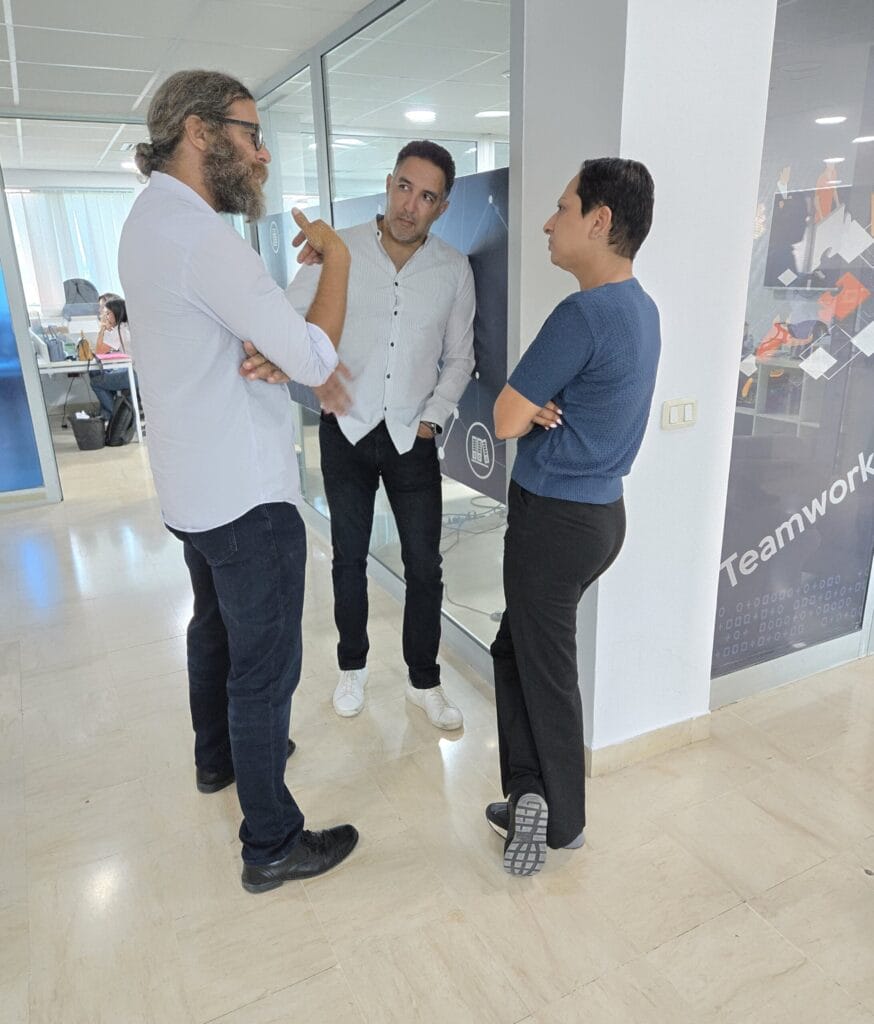Every European leader is asking the same question: “How do we find the AI talent we need now?”. This question recently took me on a discovery mission to Tunis, to assess an emerging tech hub that could be the answer.
Exploring a new Frontier for AI Talent
As a leader in the AI space, my world has been centered in San Francisco, the undisputed capital of the current AI boom and its relentless pursuit of the next big innovation. So when I found myself on a plane to Tunis, it was a fantastic and eye-opening shift in perspective.
How did this come about? A few months ago, I met Andreas Ganswindt, the founder of nearshorefriends, in San Francisco. He was on his own discovery mission, connecting with leaders to gauge the true state of the AI revolution. Our conversation sparked an idea, and he extended an invitation: “Come with me. See our partners and operations in Europe and beyond. I want your assessment.”
He wanted to know: Can the talent that nearshorefriends has cultivated in Tunisia truly support the complex, high-stakes AI projects that ambitious leaders in the Benelux and France are eager to build?
Why me? For over ten years, I’ve been on the front lines, building AI & ML products and leading high-performing AI teams for Fortune 20 and Silicon Valley startup companies alike. I’ve led teams of 15 scientists from AI centers of excellence and deployed generative AI solutions that saved millions. But just as importantly, I’ve been on the other side. Back in 2011, I was leading a large project for which I needed to quickly hire a team for Imerys in Belgium. I experienced firsthand just how challenging the European technical hiring market can be.
With this dual perspective, I accepted the invitation. What I found in Tunisia wasn’t just a “nearshoring” option; it was a deep, untapped reservoir of talent and a powerful strategic solution.
Tunisia’s Emerging AI Workforce
The first thing to understand about the Tunisian workforce is that any preconceived notions are likely wrong. I didn’t just find junior coders; I found a highly educated, multilingual, and ambitious professional class.
The office I visited was a blend of seasoned experts—including those with PhDs and many years of experience—working side-by-side with driven, early-career professionals. The linguistic capabilities are a massive, built-in advantage. On the street, in the office, and on the radio, Tunisian Arabic and French are spoken interchangeably. This isn’t just a cultural feature; it’s a powerful business asset, eliminating the friction of working with French and Belgian teams. On top of this, many professionals are also fluent in English, making them perfectly suited for any international project.
What struck me most, however, was the motivation. I saw a genuine eagerness to learn, to grow, and to tackle more challenging projects. This is a workforce that doesn’t just want a job; they want to build a career on the global stage.
Tunisia offers a surprisingly deep talent pool of highly educated, multilingual (French/ Arabic/ English), and motivated professionals, from highly-driven junior engineers to experienced PhDs.

A Pragmatic Solution for Europe's AI Ambitions
This brings me to the core business case. Right now, companies across Europe are facing a perfect storm: budgets are tight, but the pressure to adopt AI to stay competitive has never been higher.
In this environment, relying on the Tunisian workforce is an incredibly pragmatic and powerful strategic move. It directly addresses Europe’s most significant constraints. You gain access to a qualified, AI-ready workforce that can integrate seamlessly with your teams, all while realizing a significant labor cost advantage.
This isn’t just a simple cost-cutting play. It’s a value-add. It allows you to build the AI products you need to build, with the budget you actually have. It’s a sustainable way to scale your AI ambitions without breaking the bank, turning a budget constraint into a strategic opportunity.
For European companies facing tight budgets and a difficult hiring market, the Tunisian talent pool offers a high-value, cost-effective, and strategically sound solution to accelerate AI development right now.
Building Trust Across Borders
Ultimately, the success of any cross-border project comes down to people. While technology can be replicated, a genuine spirit of collaboration cannot. This becomes critical when navigating the elephant in the room: international regulation.
The EU AI Act, for instance, rightly demands a high standard of governance and transparency. This can seem like a daunting hurdle when working with a non-EU partner, but it is not an insurmountable roadblock. Based on nearshorefriends’ own experience, the key is to treat regulation not as a blocker, but as a process map that guides collaboration. It doesn’t forbid innovation; it demands accountability.
This is a challenge that is solved not by technology, but by trust. It requires a single, integrated team built on open communication and shared goals. The collaborative, solutions-oriented mindset I witnessed in Tunisia is the essential foundation for building this trust. This is a team that already has experience addressing the EU AI Act, ensuring that ambitious AI projects are not only innovative but also responsible and compliant from day one.
The EU AI Act and other regulatory barriers are a real challenge when collaborating with so-called “third party countries” — and should be handled by professional service providers with profound compliance competence.
My Personal Perspective on Tunisia’s emerging Tech Hub
This experience resonated with me on a personal level. Having managed technical teams across Silicon Valley, Europe, and the Americas, I recognized the ingredients for a world-class AI organization. I firmly believe we have fertile ground in Tunisia to quickly elevate teams there into the top league of AI talent.
My passion lies in growing people and seeing them thrive, and I’m a firm believer in the power of active knowledge transfer. I love the idea of bringing opportunities to people who want to build extraordinary careers outside of traditional tech hubs like Silicon Valley or Paris. What I saw in Tunisia was a team ready and eager for that next step.
My assessment for Andreas and nearshorefriends was clear: the potential is immense. The “how” is the next critical piece— designing the right projects, providing the right mentorship, and building the bridge of knowledge and opportunity.
I’m convinced that with the right opportunities and engaged leadership, the talent in Tunisia can quickly become a world-class AI workforce.
The Conversation Is Just Beginning
My discovery trip to Tunisia confirmed that for European companies feeling the AI talent pinch, there is a powerful and pragmatic path forward. If you’re a leader struggling to balance your AI ambitions with your budget realities, perhaps this story resonates with you.
I’d be happy to share more about what I learned. Let’s talk about what’s possible, or have a look at this Nearshore Calculator.



